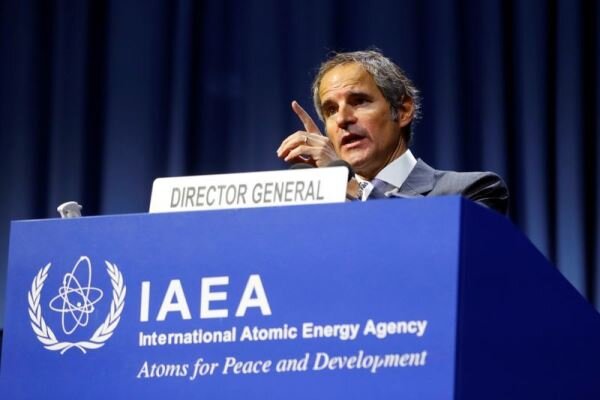IAEA chief Grossi to visit Iran soon, to meet FM Amir Abdollahian

TEHRAN – The Iranian Foreign Ministry announced on Monday that International Atomic Energy Agency (IAEA) chief Rafael Grossi will visit Tehran soon and will hold talks with Iranian Foreign Minister Hossein Amir Abdollahian.
“In addition to head of the Atomic Energy Organization (of Iran), Mr. Grossi will also meet with Mr. Amir Abdollahian,” Foreign Ministry spokesman Saeed Khatibzadeh told a regular news briefing.
“He (Grossi) has close contacts with the Atomic Energy Organization of our country and our colleagues at (Iran’s) embassy in Vienna. He has been invited and the date has been offered to him. And he will soon depart for Iran,” Khatibzadeh stated.
Grossi’s trip to Iran will most likely take place before the next meeting of the IAEA's board of governors, which will start on November 22.
News of on Grossi’s invitation comes as diplomats from Iran and the remaining parties to the 2015 nuclear deal, officially called the Joint Comprehensive Plan of Action (JCPOA), will resume talks Vienna on November 29 to discuss ways to lift the illegal U.S. sanctions on Iran.
The talks had been put on hold since June 20 as Iran was seeing a transition in which a new government came to power.
The Iranian parliament has limited the IAEA’s access to Iran’s nuclear sites in retaliation to the U.S. withdrawal from the JCPOA in May 2018 and imposition of toughest sanctions in history on the Islamic Republic.
Under the JCPOA, Iran agreed to scale down its nuclear activities in exchange for termination of economic and financial sanctions on Iran. The IAEA was tasked to monitor Iran’s compliance with the JCPOA.
Iran remained fully committed to the JCPOA one year after the U.S. quit the deal. However, in May 219 Iran announced that its strategic patience is over and started to gradually remove ban on its nuclear activities. At the time Iran announced if the European parties to the nuclear agreement fulfil their obligation under the agreement it will reverse its decision. However, the European failed to honor their commitments.
Despite limiting the IAEA’s access to nuclear sites, Iran is continuing its cooperation with the UN watchdog body within the framework of the Comprehensive Safeguards Agreement.
U.S. needs to change approach if it wants to join P4+1
Khatibzadeh also said the Vienna talks are aimed to remove sanctions on Iran in inconsistent with the JCPOA.
He reiterated Tehran’s long-held position that all the sanctions that the United States have been imposing on Iran illegally “must be lifted”.
Returning sanctions on Iran was a violation of international law as the nuclear deal is endorsed by UN Security Council Resolution 2231.
Former U.S. President Donald Trump quit the nuclear in line with his “maximum pressure” campaign against Iran.
Talks to restore the JCPOA started in April as U.S. President Joe Biden said his administration is willing to rejoin the JCPOA. The talks on return of the U.S. to the agreement started in April. Six rounds of talks were held until June 20.
“There have been some disagreements in the six rounds of the Vienna talks,” Khatibzadeh said.
He noted that Iran’s focus in Vienna will be on lifting all sanctions imposed by the United States illegally.
“We are aware of the intention of the United States, which is to join the P4+1, and they need to change their approach,” the Foreign Ministry spokesman remarked.
P4+1 refers to the permanent members of the UN Security Council (Russia, China, France, Britain) and Germany.
The diplomat then went on to say that what is important for Iran is the lifting of sanctions, and what is considered as a “verification” of the lifting of sanctions and the “necessary guarantees” will be summarized in the review process and emphasized in the discussions.
Iran only talks about regional issues with neighbors
About Robert Malley’s visit to the West Asia region and Iran's dealings with neighbors, the ministry spokesman said “Iran travels and consults with all countries in the region" with the exception of a few that cut ties with Iran.
He cited visits and consultations with Persian Gulf countries such as Oman, Qatar, Kuwait, Pakistan, and others as examples.
“The visits between Tehran and these countries indicates close relations. If you (the reporter) mean Iran consulting about the Vienna talks with the regional countries, we only talk to the regional countries about regional issues,” Khatibzadeh reiterated.
What is important is how to reach a good agreement
The spokesman also responded to a question about Deputy Foreign Minister Ali Bagheri Kani’s visit to certain European capitals and the starting point of the Vienna talks, saying, “Bagheri's visit to Europe was done as the political deputy and he is the senior negotiator and the three countries that he traveled to, are present in the Vienna talks.”
The diplomat added that Bagheri met with the senior negotiators of the UK, France, and Germany as well as other officials to discuss bilateral relations.
Khatibzadeh said Bagheri’s tour had three dimensions. He met with bilateral and regional officials as well as senior negotiators.
"What is important is how to reach a good agreement in Vienna. Where the dialogue takes place is a secondary and minor issue," he pointed out.
“The United States needs to change its approach and to ensure that we have the real guarantees necessary for the lifting of the sanctions against the Iranian people,” the spokesman emphasized.
Tehran observes Biden’s behavior
In response to a question about Biden’s letter to remove Iran from the global oil market, the spokesman noted that all these behaviors are carefully observed in Tehran, and the Vienna talks will go forward accordingly.
Leave a Comment